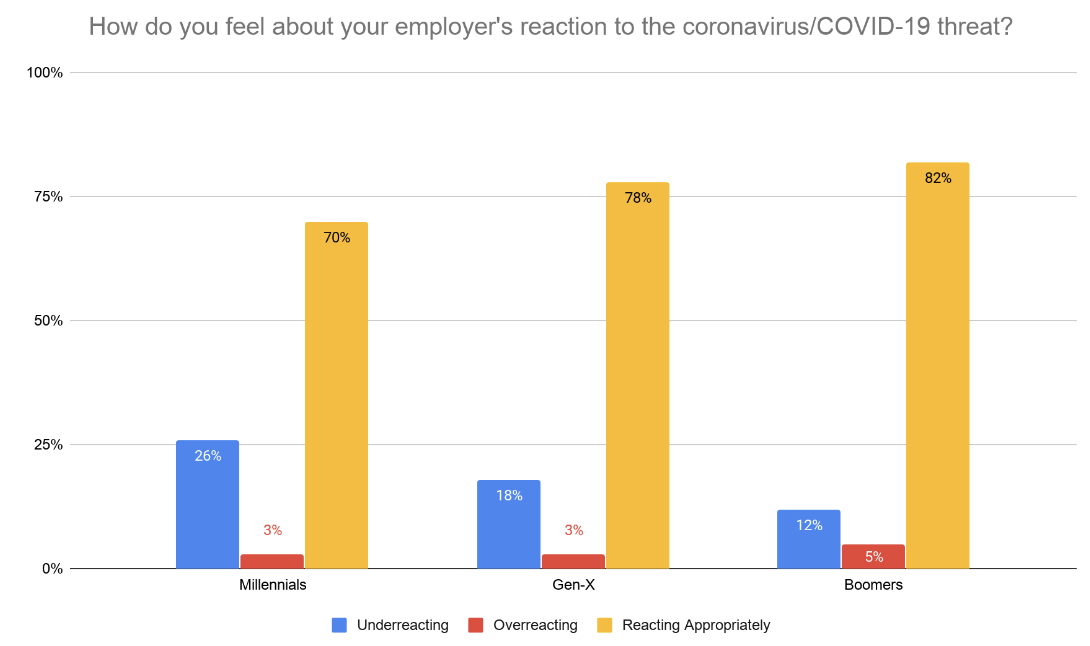Over Half of US Employees Say That a Work from Home Policy Would Seriously Harm Productivity
March 13, 2020
Over Half of US Employees Say That a Work from Home Policy Would Seriously Harm Productivity
Trust remains the top form of measurement for remote productivity, with 71% of workers trusting colleagues to continue to be productive virtually, according to new research
San Jose, Calif., March 13, 2020 – Wrike, the most versatile collaborative work management platform, today released data from its new preparedness survey, Remote Work Survey: Productivity Measurement Amidst COVID-19, detailing how workers felt about their employers’ preparedness for extended remote work as a large part of the country shifts to work remotely. Nearly half of workers (49%) say they had never worked from home prior to the outbreak of COVID-19. An additional 23% say they only work from home during special circumstances, such as caring for sick kids or during extreme weather events.
A significant number of workers felt uneasy about working from home, with 43% of professionals noting that they don’t believe they can do their jobs as effectively when compared to working out of their office. As a large segment of full-time employees are being forced to work remotely due to COVID-19, the results point to a disruptive experience for this pool of employees new to working from home.
For virtual collaboration, old school tools still rule the workplace
Technology has the ability to help connect teams and foster collaboration; however, despite the proliferation in recent years of real-time communication tools, email reigns as the most common tool used for virtual collaboration (85%), followed by voice conferencing (67%). Just over 50% of respondents report using video conferencing, and just over 45% said they use messaging platforms. Collaborative Work Management (CWM) platforms, which include tools for virtual project and task management, are used by just over 10%.
Remote work across generations
Millennials were 44% more likely than baby boomers to say that they could do their jobs just as effectively from home. This could be because they are digital natives and more comfortable adopting and using the technology available to them. Boomers, by contrast, were 51% more likely than millennials and 19% more likely than Gen-X to say they “strongly disagree” that they could do their jobs from home.
Other key findings include:
“The findings of this survey offer some hopeful insights, but there are also some serious red flags regarding the readiness of employers to mandate a work from home policy,” said Andrew Filev, founder and CEO at Wrike.
“We see a clear need for more businesses to move beyond email as the primary means of internal collaboration so that their employees will have better alignment and faster communication while working remotely. There’s also a massive need for investment in tools that can empower workers to do their best work from anywhere - at home or in the office. This unprecedented public health crisis is going to be a trial by fire for companies that haven’t previously invested in remote work, but those who have already built a culture around virtual collaboration should be well-positioned to execute and keep employees engaged and productive.”
To enable companies to work more effectively in remote environments, Wrike is offering its Pro plan free for six months to new customers.


Methodology
Wrike’s research was conducted using a sample size of 1,000 respondents in the United States. The research targeted individuals employed full-time by organizations of more than 200 employees. The online survey was conducted between March 11th and 12th, 2020 with a margin of error 3%. In some instances, totals in this document may not add up to 100% due to rounding. Members of Generation Z were included in the survey, but were omitted from generational analysis due to small sample size.
Wrike is an intelligent work management platform where anyone can build, connect, automate, and scale workflows so work flows without limits. With unmatched intelligence, versatility, flexibility, scalability, and security, Wrike breaks down the barriers that hinder modern work and creates new pathways to success. More than 20,000 customers do the best work of their lives on Wrike. Find out how work flows at www.wrike.com.
Media Contact
Arlena Jackson
Sr. Manager, Corporate Communications
[email protected]
TRUSTED BY 20,000+ HAPPY CUSTOMERS WORLDWIDE